Information Retrieval PhD Seminar
情报学的英文专业术语
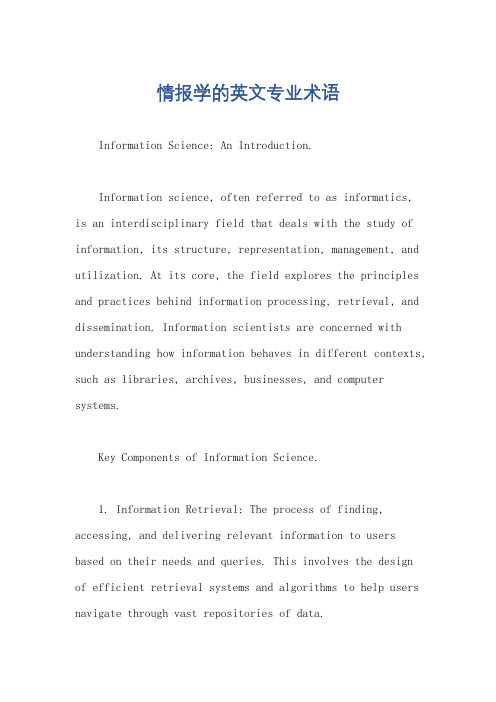
情报学的英文专业术语Information Science: An Introduction.Information science, often referred to as informatics,is an interdisciplinary field that deals with the study of information, its structure, representation, management, and utilization. At its core, the field explores the principles and practices behind information processing, retrieval, and dissemination. Information scientists are concerned with understanding how information behaves in different contexts, such as libraries, archives, businesses, and computer systems.Key Components of Information Science.1. Information Retrieval: The process of finding, accessing, and delivering relevant information to users based on their needs and queries. This involves the designof efficient retrieval systems and algorithms to help users navigate through vast repositories of data.2. Information Organization: The art and science of classifying, indexing, and cataloguing information to make it easier to find and retrieve. This involves creating structures and systems that help users understand the relationships between different types of information.3. Information Storage and Management: The process of preserving, storing, and managing information over time. This includes considerations for data integrity, security, and access control.4. Information Systems: The design and development of computer-based systems that support information processing, retrieval, and decision-making. These systems range from simple databases to complex information architectures.5. Information Ethics and Privacy: The study of ethical principles and practices related to the collection, use, and dissemination of information. This includes considerations for intellectual property rights, privacy protection, and ethical guidelines for informationprofessionals.Applications of Information Science.Information science finds applications in various fields, including:Libraries and Archives: Libraries and archives rely on information science principles to organize, catalogue, and preserve collections of books, documents, and other materials.Business and Management: Information systems and data analytics are crucial in businesses for decision-making, market research, and operational efficiency.Computer Science: Information science contributes to the design and development of efficient algorithms and data structures for information retrieval and management.Education: Educators use information science techniques to create effective learning materials andteaching strategies that enhance student learning.Healthcare: Information science plays a vital role in healthcare by supporting patient care, medical research, and the management of health records.Future Trends in Information Science.As technology continues to evolve, so do the challenges and opportunities in information science. Here are some key trends shaping the future of the field:Big Data and Analytics: The exponential growth of data has led to a focus on developing efficient algorithms and tools for data analysis and visualization.Artificial Intelligence and Machine Learning: These technologies are revolutionizing information retrieval and recommendation systems, making them more intelligent and adaptive to user needs.Information Security and Privacy: The increasingimportance of protecting sensitive information has led to a focus on developing robust security measures and privacy-enhancing technologies.Semantic Web and Linked Data: These concepts aim to make web-based information more machine-readable and interconnected, enabling more intelligent and semantic-based search and retrieval.User-Centered Design: Information systems are increasingly being designed with a focus on user experience and accessibility, ensuring that they are easy to use and meet the needs of diverse user groups.In conclusion, information science is a dynamic and evolving field that plays a crucial role in our digital world. It continues to adapt and grow as new technologies and challenges emerge, shaping the way we access, manage, and utilize information in various contexts.。
Seminar

Making your slides
Good practices Text Use large fonts (at least 18 pts) for words and numbers Keep words/sentences to a minimum and avoid long sentences Use points or bullets Include a title for each slide Bad practices Presenting a long paragraph
Suggested Structure
Methodology, data collection and analyses Experimental work
•Explain how you plan/have used your equipment to collect the necessary data •Describe the experimental considerations, including calibration procedures and possible measurement errors
Making your slides
Points to keep in mind:
•Structure your presentation so that the audience can follow your thoughts •Slides can carry a significant amount of information •Sometimes they carry far too much information •A rule of thumb for the maximum number of slides is about 2 per minute.
信息检索语言名词解释

信息检索语言名词解释在当今信息爆炸的时代,快速准确地获取所需信息成为了一项非常重要的能力。
而信息检索语言作为一种用于检索特定信息的工具,也逐渐引起了人们的关注。
本文将对信息检索语言进行解释,并深入探讨其定义、分类、应用以及未来发展趋势等方面。
一、定义信息检索语言(Information Retrieval Language,简称IRL)是一种用于从大规模的信息资源中获取所需信息的工具。
它通过特定的语法和命令,将用户的查询需求转化为计算机可以理解的形式,并根据用户的要求,精确地匹配和提取相应的信息。
IRL旨在提高信息检索的准确度和效率,帮助用户在海量的信息中迅速找到所需内容。
二、分类基于不同的用途和功能,IRL可以分为几种常见的类型。
1. 布尔检索语言(Boolean Retrieval Language)布尔检索语言是最早应用于信息检索领域的一种语言类型。
它主要依据布尔运算的原理,通过逻辑的组合和排除来实现信息的检索与过滤。
用户可以通过基本的布尔运算符(AND、OR、NOT)和括号组合自己的查询语句,以获取满足特定条件的信息。
2. 自然语言查询语言(Natural Language Query Language)自然语言查询语言是一种使用自然语言描述查询需求的检索语言。
它利用语言理解和处理技术,将用户的自然语言查询转化为计算机可执行的检索语言。
相比于其他IRL类型,自然语言查询语言更加简便易用,能够接受非专业用户的查询。
3. 基于模式的查询语言(Pattern-based Query Language)基于模式的查询语言是一种使用特定模式描述查询需求的检索语言。
它通过定义关键词的组合和排列方式,指导计算机在大数据集中查找与其模式匹配的信息。
基于模式的查询语言常被应用在关键词提取、信息分类和数据挖掘等领域。
三、应用信息检索语言在各个领域具有广泛的应用。
以下是几个常见的应用场景。
1. 互联网搜索引擎互联网搜索引擎通过用户输入的查询语句,利用信息检索语言在大量的网页中进行检索。
武汉大学信息检索整理

名词解释1.信息检索(Information Retrieval)是指将信息按一定的方式组织和存储起来,并根据信息用户的需要找出有关信息的过程。
2.引文索引是一种将科技期刊、专刊、专题丛书等文献资料所发表的论文后所附的参考文献的作者、题目、出处等项目,按照引证与被引证的关系进行排列而编制的索引。
3.CALIS:China Academic Library and Information System中国高等教育文献保障系统。
4.邻近检索是用一些特定的算符(位置算符)来表达检索词与检索词之间的关系,并且可以不依赖叙词表而直接使用自由词的检索方法。
5.搜索引擎(Search Engine)是一种Web 上应用的软件系统,它以一定的策略在Web 上搜集和发现信息,在对信息进行处理和组织后,为用户提供Web信息查询服务。
用户可以通过主题浏览和关键词检索的方式搜索所需信息。
6.截词检索:是指在检索标识中保留相同的部分,用相应的截词符代替可变化部分。
检索中,计算机会将所有含有相同部分标识的记录全部检索出来。
截词符一般用“?”或“*”表示,但不同的数据库中有所差别。
7.查准率:是指检出文献中合乎需要的文献数量占检出文献全部数量的比例。
8.查全率:是指检出的文献数量占数据库中全部相关文献数量的比例。
9.文献及其要素“文献”是泛指“有历史价值或参考价值的图书资料。
”要素:1、构成文献内核的信息、知识、数据、事实.2、载体信息、知识、数据、事实的物质载体。
3、记录信息、知识、数据、事实的符号系统。
10.专利文献:专利文献是实行专利的国家、地区及国际专利组织在批审专利过程中产生的官方文件及出版物,包括专利说明书、专利权利要求书、专利公报、专利分类表、专利检索工具等。
11.三大检索系统:SCI(《科学引文索引》,EI是美国《工程索引》(TheEngineeringIndex)的简称,ISTP是IndextoScientific&T echnicalProceedings的缩写。
信息检索基本知识及技巧
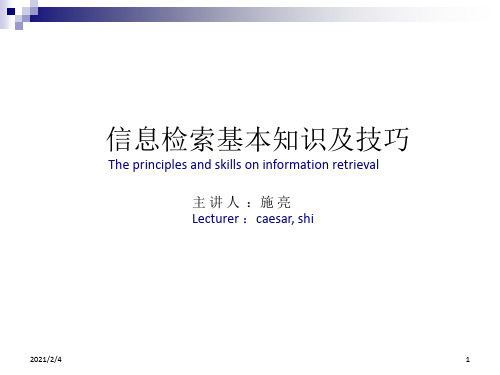
2021/2/4
25
美国国会图书馆图书分类法 —— Library of Congress Classification
2021/2/4
26
第一层
2021/2/4
27
末层
2021/2/4
28
中国图书馆图书分类法——Chinese Library Classification, CLC
中国图书馆分类法,简称《中图法》。包括“马列主义、毛泽东思想,哲学,社会科学,自然科学, 综合性图书五大部类,22个基本大类,具体如下:
信息检索基本知识及技巧
The principles and skills on information retrieval
主 讲 人 :施 亮 Lecturer :caesar, shi
2021/2/4
1
目录 outline
一 信息检索的定义、分类及其作用 二 检索语言 三 检索的效率、手段和方法
1、早期皮肌炎患者,还往往伴 有全身不适症状,如-全身肌肉酸 痛,软弱无力,上楼梯时感觉两 腿费力;举手梳理头发时,举高 手臂很吃力;抬头转头缓慢而费 力。
国际专利分类法—— International Patent Classification , IPC
《关于国际专利分类斯特拉斯堡协定》与1975年10月7日生效,它为发明专利, 包括出版的专利申请书、发明证书说明书、实用新型说明书(一下简称为“专利文 献”) 提供了一种共同的分类。
2021/2/4
15
附:期刊的指数计算
影响因素是一种期刊中论文的平均被引率
(特1)定影年响度因的素影响因素 =
该年引用该刊前两年文章的总次数 前两年该刊所发表文章的总数
即年指标 用于测度一种期刊被利用的速度,也是测度期刊重要性的依据
信息检索 课程简介
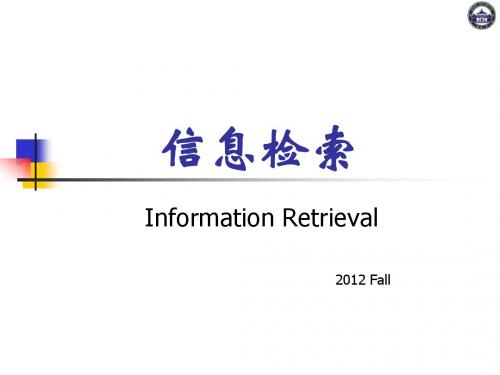
(1)信息素质的重要性,信息检索的相关概念; (2)计算机信息检索的基本方法——布尔逻辑 检索、位置算符检索、截词检索、字段限制检 索、短语检索、括号检索、自然语言检索、多 语种检索、模糊检索、区分大小写的检索,以 及多种检索方法的综合运用、检索式的构造; (3)信息检索的步骤,含五个步骤及每个步骤 中要注意的问题; (4)搜索引擎,介绍重要的中英文综合性搜索 引擎、学术搜索引擎、专业搜索引擎;
课程内容
(5)国内外重要的数据库,包括中国知 网、工程索引、三大引文索引等; (6)网上免费信息资源的获取; (7)信息资源的选择与评价; (8)信息检索的应用与个人信息管理, 包括如何进行选题前的查新、如何跟踪学 科前沿和获得最新的科研资料等。
课程目的
信息检索是全校工程硕士必修课,以培养 学生网络信息检索与利用的能力为目的。 通过该课程的学习,要求达到:
(1)掌握网络信息检索的基本方法; ( 2 )熟悉常用搜索引擎和重要数据库的作用、 特点与使用方法; (3)掌握信息选择与分析的基本技能; ( 4 )学会综合运用各种信息资源全面获取本 专业全面而前沿的学术信息。
信息检索
Information Retrieval
2012 Fall
内容
课程目的 教学方法 参考书目 考试形式 注意事项 课程内容
课程背景
在知识经济时代,知识的掌握源于信息的累积, 研究生的信息素养(information literacy)是科研 能力的重要组成部分,其培养正在引起世界各 国越来越广泛的重视,并逐渐加入从小学到大 学的教育目标与评价体系之中,成为评价人才 综合素质的一项重要指标。在信息素养包括的 各种能力中,信息检索能力是其中的核心部分。 可以说,利用计算机与因特网获取、开发与利 用信息资源的能力已成为当代研究生的必备素 质,是提高公民信息素养、实现“终身学习” 的需要,也是提高社会信息化水平的需要。
加州大学伯克利分校博士申请
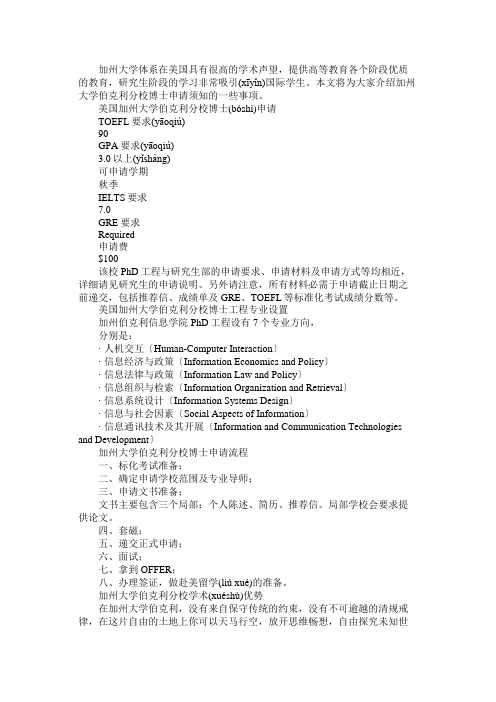
加州大学体系在美国具有很高的学术声望,提供高等教育各个阶段优质的教育,研究生阶段的学习非常吸引(xīyǐn)国际学生。
本文将为大家介绍加州大学伯克利分校博士申请须知的一些事项。
美国加州大学伯克利分校博士(bóshì)申请TOEFL要求(yāoqiú)90GPA要求(yāoqiú)3.0以上(yǐshàng)可申请学期秋季IELTS要求7.0GRE要求Required申请费$100该校PhD工程与研究生部的申请要求、申请材料及申请方式等均相近,详细请见研究生的申请说明。
另外请注意,所有材料必需于申请截止日期之前递交,包括推荐信、成绩单及GRE、TOEFL等标准化考试成绩分数等。
美国加州大学伯克利分校博士工程专业设置加州伯克利信息学院PhD工程设有7个专业方向,分别是:·人机交互〔Human-Computer Interaction〕·信息经济与政策〔Information Economics and Policy〕·信息法律与政策〔Information Law and Policy〕·信息组织与检索〔Information Organization and Retrieval〕·信息系统设计〔Information Systems Design〕·信息与社会因素〔Social Aspects of Information〕·信息通讯技术及其开展〔Information and Communication Technologies and Development〕加州大学伯克利分校博士申请流程一、标化考试准备;二、确定申请学校范围及专业导师;三、申请文书准备;文书主要包含三个局部:个人陈述、简历、推荐信。
局部学校会要求提供论文。
四、套磁;五、递交正式申请;六、面试;七、拿到OFFER;八、办理签证,做赴美留学(liú xué)的准备。
信息检索概述武大黄如花专业知识讲座
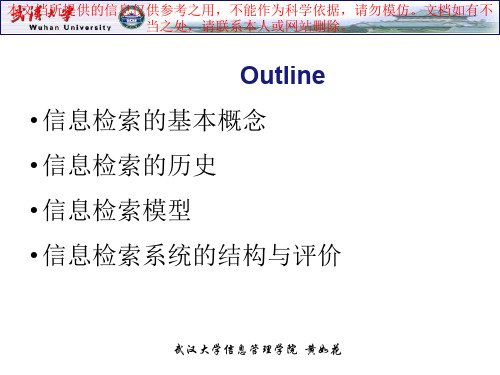
科技报告
学位论文
编辑出版形式
标准文献 技术档案
产品资料
武汉大学信息管理学院 黄如花
本文档所提供的信息仅供参考之用,不能作为科学依据,请勿模仿。文档如有不 SCIENTIFIC SOLUTIONS 当之处,请联系本人或网站删除。 3 信息检索的原理
• 狭义的信息检索
• information storage • information retrieval
• information retrieval
武汉大学信息管理学院 黄如花
本文档所提供的信息仅供参考之用,不能作为科学依据,请勿模仿。文档如有不 SCIENTIFIC SOLUTIONS 当之处,请联系本人或网站删除。 信息检索的常用术语 • 检索词:用户输入的字、词、字符或短语 • 检索式:检索提问表达式 • 检索策略:是对查询的全面策划,在操作上主要指数据库的选择和检索 式的编制 • 前者选择数据库资源,后者实现检索目标 • 一般也直接将检索式视为搜索策略
Student Assessment( PISA)项目
武汉大学信息管理学院 黄如花
本文档所提供的信息仅供参考之用,不能作为科学依据,请勿模仿。文档如有不 SCIENTIFIC SOLUTIONS 当之处,请联系本人或网站删除。 • PISA蕴含的意义 • 在这个迅速变化的时代,学生不可能在学校里学到将来所需的每一种知 识和技能,必须在具备阅读、数学、科学等方面基础的前提下,努力培 养自己的学习能力。学会如何学习(learn how to learn),将比学会事 实(learn to know)更为重要。
Wisdom
Knowledge
Information Data
Information Hierarchy
- 1、下载文档前请自行甄别文档内容的完整性,平台不提供额外的编辑、内容补充、找答案等附加服务。
- 2、"仅部分预览"的文档,不可在线预览部分如存在完整性等问题,可反馈申请退款(可完整预览的文档不适用该条件!)。
- 3、如文档侵犯您的权益,请联系客服反馈,我们会尽快为您处理(人工客服工作时间:9:00-18:30)。
Prof. Borgman, Info Studies 293, Info Retrieval PhD Seminar, Fall, 2006, page 1 Information Studies 293, UCLA Fall, 2006 Thursdays, 9:00am-12:30pm GSE&IS Room 245
Information Retrieval PhD Seminar
Christine L. Borgman, Professor & Presidential Chair in Information Studies Department of Information Studies 235 GSE&IS Bldg. 310/825-6164 borgman@gseis.ucla.edu
This course is offered in alternate years as one of the six seminars for the Information Studies PhD program. It was last taught in Winter, 2005 by Jonathan Furner. The syllabus draws heavily on Prof. Furner’s course design.
Catalog description
“Seminar, four hours. Designed for Ph.D. students. Intellectual principles for organization of information, including principles for design of systems for acquiring, organizing, and retrieving information. Also includes system-specific user studies to the extent that design of information systems is predicated on their evaluation and use. S/U or letter grading.”
Objectives
The aim of this course is to provide an introduction to some of the principal research issues in the doctoral specialization area of information retrieval (a.k.a. information systems). It is intended to lay the foundation for doctoral students’ preparation in this area before proceeding to the Written Qualifying Examination.
Outcomes
Upon satisfactory completion of this course, you will have demonstrated:
• your knowledge and appreciation of the history of research in the field, of its philosophical foundations, of its core literature, and of participating scholars and institutions; • your ability to identify, analyze, and articulate significant research problems; • your ability to apply appropriate research methodologies to the problems identified; and • your understanding of key theoretical and practical contributions to the field.
Prof. Borgman, Info Studies 293, Info Retrieval PhD Seminar, Fall, 2006, page 2 Course audience, prerequisites The course is intended for PhD students in Information Studies. Others may enroll with instructor’s permission if they have background commensurate with IS PhD students. This course addresses history and theory, not practice. Those interested in practical aspects of the design of information retrieval systems should take the master’s level courses in information retrieval, information technology, digital libraries, digital archives, and systems analysis and design.
Grading procedures and policy See separate document for details of assignments 40% In-class presentations and short papers (2 @ 20%) 40% Seminar paper 20% Class participation
Readings are to be completed prior to the class meeting for the week. The grade for class participation will be based on preparation for the discussion, contributions to the discussion, and attendance. The course is conducted as a research seminar.
Late assignments will be marked down 2 points per day late. No assignments will be accepted after 5pm Thursday, December 14 without advance permission from the instructor.
Course materials Course materials are in three categories (bibliographic references at end of document) 1. Required for purchase: Sparck Jones, K. and P. Willett, Eds. (1997). Readings in Information Retrieval. San Francisco, Morgan Kaufmann. Available at LuValle Commons Bookstore.
2. Available online or in the UCLA libraries: Readings not in the text are available online, either through the UCLA libraries or free on the World Wide Web. Those only in print are being scanned and made available in the online reserve system. To access the UCLA library databases from off campus, you must have a proxy server or VPN client set up. Most of the older articles also are available in print in the UCLA libraries.
Note that printing resources in the MIT lab are limited. Please print at home or read online (an inexpensive laser printer is a good investment for graduate school). Prof. Borgman, Info Studies 293, Info Retrieval PhD Seminar, Fall, 2006, page 3 3. Other Resources
A. Materials from Prof. Furner’s master’s-level class in information retrieval (INFS 276):
• “Resources” document listing texts, journals, conferences, information services, and systems, with which you should be familiar: http://polaris.gseis.ucla.edu/jfurner/02-03/276/276res.doc
• Reading list: http://polaris.gseis.ucla.edu/jfurner/02-03/276/276syl.doc
• PowerPoint slides and handouts on individual topics: http://polaris.gseis.ucla.edu/jfurner/02-03/276/276.html
